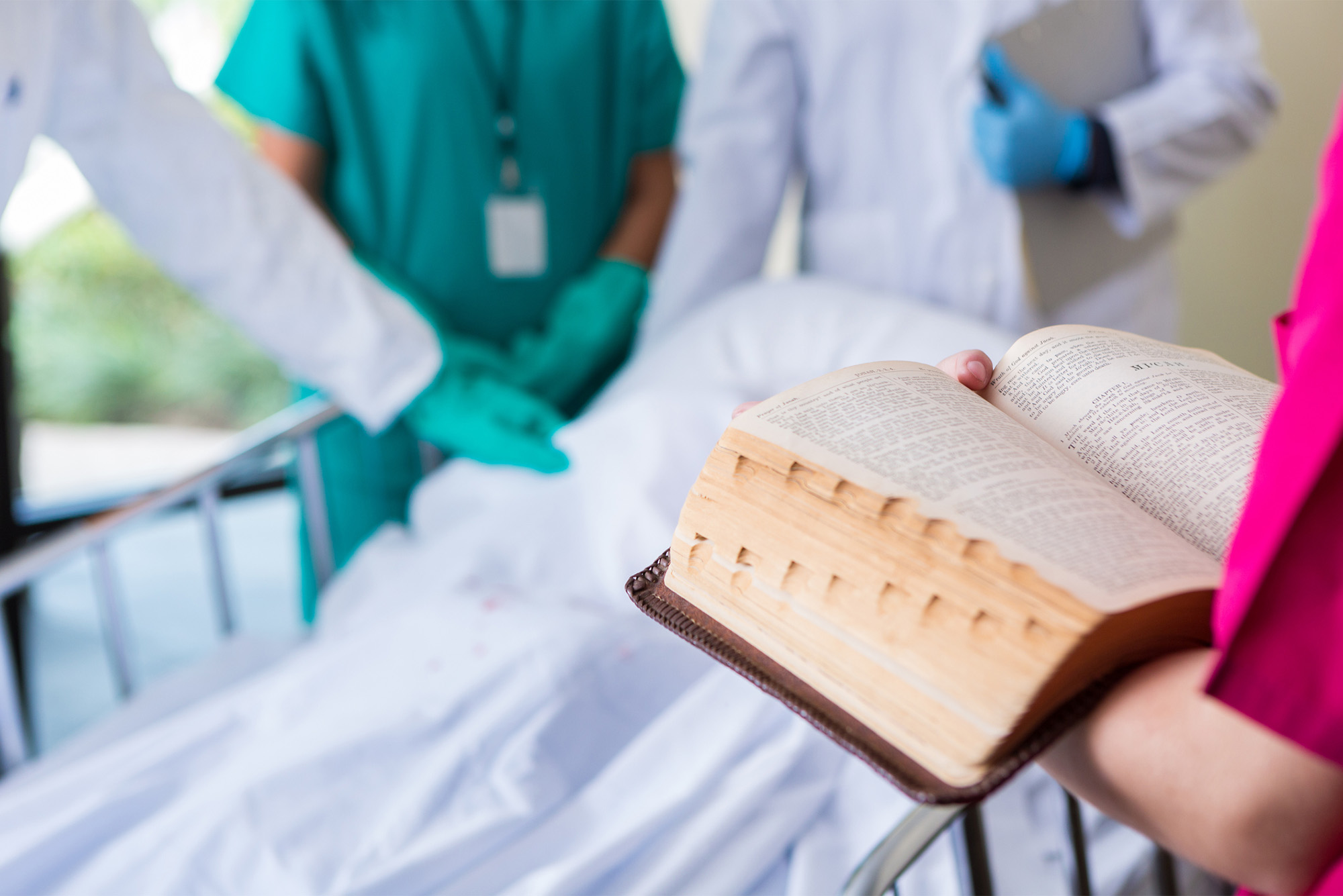From HIV/AIDS to COVID, New Minor Probes Religion in Science and Medicine

A new College of Arts & Sciences minor probes the overlap among religion, medicine, and other sciences. Photo by iStock/SDI Productions
From HIV/AIDS to COVID, New Minor Probes Religion in Science and Medicine
CAS courses, aimed especially at pre-health students, show how people mix the sacred and science
Some conservative Christians refuse COVID-19 vaccination on religious grounds. Some Bible Belt pastors, contrarily, chalk up such objections to religious ignorance and advise their congregants to get their shots. This clash is nothing new. Religion and science warily circling each other dates back at least to Copernicus, whose replacement of the Earth with the sun as the center of the solar system was regarded as heresy by many religious leaders.
How religion inflects science is enduring and important enough that the College of Arts & Sciences religion department has a new minor, titled, aptly, Religion in Science and Medicine. One course revisits the contentious morality debate surrounding the HIV/AIDS epidemic in the 1980s and ’90s.
In a recent session of Anthony Petro’s class HIV/AIDS, Art, and Religion in America, the CAS associate professor of religion guided students through a discussion of his 2015 book After the Wrath of God, its opening quoting the prominent evangelical minister Billy Graham in 1993: “Is AIDS a judgment of God?….I could not say for sure, but I think so.”
Talking about health effects can “smuggle in all sorts of moral or even theological reasons” for opposing something, Petro tells his students. He runs down the history of the word “sodomy,” originating from the sins that led God to destroy the biblical city of Sodom, and how it came to apply to gay sex. And if the Almighty could wipe out Sodom’s innocents along with its sinners, one student muses, might He not smite straight Americans, who contracted AIDS as well, for tolerating the putative sin of homosexuality?
“Clearly, AIDS is the smiting” in conservative Christian thinking, agrees Rachel Markenson (CAS’22). A psychology major who is minoring in religion, she took Petro’s class, she says in an interview, because of a long-standing interest in the medicine-religion nexus.
“Honestly, if the religion, science, and medicine minor had been available earlier—like back when I was a freshman or sophomore—I would have done it,” she says. “The application of religion to scientific spaces, I think, is something we tend to ignore. I’m a psych major, right? so the fact that we’re ignoring religion is really obvious in that field. [Yet] it impacts so much of how we think and what we do.” Psychologists focus on behavioral influences such as culture, she says: “I feel like religion is an aspect of culture that is severely underplayed.”
Petro believes the University is in the vanguard of schools offering such a minor: the University of Arizona has sought BU’s guidance in developing its own similar program. He designed the minor with April Hughes, a CAS assistant professor of religion and the department’s director of undergraduate studies, who says it’s especially intended for undergrads in the health sciences.
Undergrads like behavior and health major Susan Cook (Sargent’23), who is taking Petro’s class. She’s minoring in the new offering with a view toward her postgraduate plans: “I think I potentially would like to work in clinical psychology, maybe even be part of a palliative care team, where I’m working a lot around this idea of death and how to approach death. And I think the minor of religion in science and medicine will help to better approach conversations around death and dying.
“This class just seemed super-interesting to me because it combined ideas of religion and health, which are really wound up in this idea of approaching end of life.”
Older courses touching on faith and science have been popular, Petro says, including one he has taught since 2013, whose name and topic—Religion, Health, and Medicine—presaged the new minor. It’s popular enough that “I usually have to cap it well below however many folks would take it, and it attracts a lot of students who are in pre-health fields,” he says. “Mostly they’re just curious, and [religion in medicine] hadn’t occurred to them.…They’re so focused on fulfilling organic chemistry and all of their very important science requirements.”
Humanities courses like his “remind them that these are also human practices,” Petro says. “I don’t think they’re getting a lot of that in their organic chem class.” He and Hughes designed the minor to increase that awareness, as well as the number of students studying religion.
While some students who take religion classes are personally religious, Hughes adds, “that’s not really our main constituency.”
Other classes in the minor probe topics such as Islamic and Buddhist bodily ethics (contraception, assisted birth, suicide, and euthanasia) to accommodate premed students who must take a situational ethics exam. “When you kind of delve into how another culture understands something,” Hughes says, “I think it gives [students] a different perspective.”
Among the minor’s other classes: Death and Immortality; Religion in the Digital Age; Magic, Science, and Religion; and Jewish Bioethics and Holocaust Studies.
Comments & Discussion
Boston University moderates comments to facilitate an informed, substantive, civil conversation. Abusive, profane, self-promotional, misleading, incoherent or off-topic comments will be rejected. Moderators are staffed during regular business hours (EST) and can only accept comments written in English. Statistics or facts must include a citation or a link to the citation.